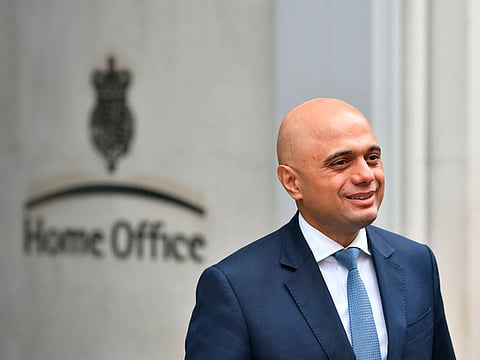For Sajid Javid, the ‘hostile environment’ is political and personal
New home secretary maintains cabinet Brexit balance — just — but Windrush backlash could put him on collision course with May

The new home secretary, Sajid Javid, the first BAME holder of one of the great offices of state, will find an inbox brimming not just with the backlash over the Windrush scandal, but with arguments to come over policing cuts and rising knife crime as well as a difficult counter-terror climate.
A former investment banker and Thatcher devotee, Javid’s instincts are on the right of the party. His appointment will keep the technical balance of EU leavers and remainers in the top offices, but only just. Javid backed remain in the referendum, but with some hesitation and probably under pressure from David Cameron. He has since swung behind leavers in the cabinet.
Just last week, he tweeted a hard line on the customs union, saying: “British people gave politicians clear instructions through EU referendum ... includes leaving the customs union, an intrinsic part of the EU. Britain must leave [customs union] and be able to negotiate and sign own trade deals.”
Born in Rochdale in 1969, like the mayor of London, Sadiq Khan, he is another Muslim son of a bus driver who has risen to the top of British politics. His parents were born in India, but fled to Pakistan while still small children. His father arrived in Britain in the 1960s — Javid has said he came with £1 in his pocket.
His other hero apart from Margaret Thatcher is Ayn Rand — he recounted once that he regularly rereads the courtroom scene from her novel The Fountainhead, telling the Spectator he admired its description of “the power of the individual ... sticking up for your beliefs, against popular opinion”.
After leaving banking for politics in 2010 — he once quipped it was “another unpopular profession” — the new MP for Bromsgrove rose quickly, beginning as parliamentary private secretary to George Osborne before continuing as a protégé of the former chancellor in junior roles at the Treasury.
He got his first cabinet job in just his fourth year in parliament when he was appointed culture secretary in 2014, and got the position of business secretary after the 2015 election.
After an abortive attempt with his friend Stephen Crabb to mount a bid for the leadership, where he would have been chancellor, he took the communities brief under May, with the explicit task of overseeing the prime minister’s pledge to tackle the housing crisis.
Their relationship has not been close — he was privately critical of the 2017 election campaign and the conduct of advisers in No 10 — though she has backed him in arguments with the Treasury.
On housing, he has clashed with the chancellor, Philip Hammond, who rejected Javid’s demand for a £50 billion cash injection to fund a massive house building drive.
His housing white paper admitted the market was “broken” and laid the blame almost entirely on low rates of house building, but Labour said the proposals were feeble with limited proposals to help renters.
His biggest challenge in the brief, however, has been the Grenfell Tower disaster, where the government has faced mounting criticism for stalling on promises to the victims’ families. He admitted just weeks ago the government is likely to break its promise to permanently rehouse within a year all those made homeless.
The focus will now be on how Javid responds to concerns about the ripple effects of the Home Office’s “hostile environment”, a policy which May has underlined in recent weeks that she sees no reason to halt, despite its devastating impact on Windrush-era migrants pursued unjustly for their paperwork.
It is an issue which is personal for Javid. In an article just this weekend, he told the Sunday Telegraph: “I thought that could be my mum ... my dad ... my uncle ... it could be me.”
However, should Javid intend to stamp a new culture on the Home Office, it could put him on a collision course with his boss.
Sign up for the Daily Briefing
Get the latest news and updates straight to your inbox



